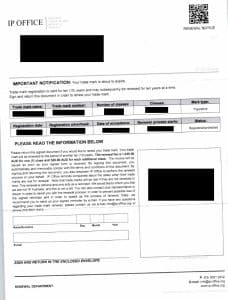Trade Mark Scam Alert
Scammers regularly target the owners of registered trade marks, but more recently these types of scams have skyrocketed. Trade Mark owners should be on high alert.
Scammers obtain information about a business and its trade marks from the IP Australia Trade Marks Register – a publicly available and online platform which is free to access. The scammers use this information to send a purported “ renewal notice” to the business. While the notice can look official and contain trade mark and ownership details, they are unsolicited and often misleading or fraudulent. Many include what looks like “official” seals or government indicia.
The renewal notice incorrectly advises the trade mark owner that the trade mark must be renewed immediately. However, in many of the cases we have seen, the actual renewal date is 2 years later. So, the scammers are notifying the trade mark owners before the renewal period even opens (which is 1 year before the renewal deadline). The notice usually requests a signature from the trade mark owner to approve payment of the renewal fees. If the notice does not include an invoice, the scammers then send the trade mark owner an invoice for payment. The fees requested are usually exorbitant and, in many cases, the trade mark is not renewed when the renewal window opens.
An example of a typical scam renewal notice can be found below for your reference.
What you can do to stop scammers
- Tell your relevant staff to be on the lookout for these unsolicited notices and not make any payment without checking with you.
- If you doubt the legitimacy of any correspondence received regarding your trade marks, please run it past our IP team, especially if fees are requested. DO NOT SEND TO YOUR ACCOUNTS TEAM FOR ACTIONING.
- If Macpherson Kelley is managing your current trade mark portfolio, then any correspondence relating to your trade marks will be sent directly by us on our letterhead. If the correspondence is sent from a different organisation, it is likely to be a scam. If something doesn’t look or feel right, follow your gut and give us a call.
- Please don’t hesitate to reach out to Macpherson Kelley’s IP team if you have any suspicions whatsoever. A short phone conversation could save you thousands of dollars.
The information contained in this article is general in nature and cannot be relied on as legal advice nor does it create an engagement. Please contact one of our lawyers listed above for advice about your specific situation.
more
insights
Implied contract terms: Court of Appeal confirms no implied right for hospital to terminate long term emergency services agreement
Bunnings faces off against the Privacy Commissioner over facial recognition technology
Navigating Australia’s new trade mark regulations
stay up to date with our news & insights
Trade Mark Scam Alert
Scammers regularly target the owners of registered trade marks, but more recently these types of scams have skyrocketed. Trade Mark owners should be on high alert.
Scammers obtain information about a business and its trade marks from the IP Australia Trade Marks Register – a publicly available and online platform which is free to access. The scammers use this information to send a purported “ renewal notice” to the business. While the notice can look official and contain trade mark and ownership details, they are unsolicited and often misleading or fraudulent. Many include what looks like “official” seals or government indicia.
The renewal notice incorrectly advises the trade mark owner that the trade mark must be renewed immediately. However, in many of the cases we have seen, the actual renewal date is 2 years later. So, the scammers are notifying the trade mark owners before the renewal period even opens (which is 1 year before the renewal deadline). The notice usually requests a signature from the trade mark owner to approve payment of the renewal fees. If the notice does not include an invoice, the scammers then send the trade mark owner an invoice for payment. The fees requested are usually exorbitant and, in many cases, the trade mark is not renewed when the renewal window opens.
An example of a typical scam renewal notice can be found below for your reference.
What you can do to stop scammers
- Tell your relevant staff to be on the lookout for these unsolicited notices and not make any payment without checking with you.
- If you doubt the legitimacy of any correspondence received regarding your trade marks, please run it past our IP team, especially if fees are requested. DO NOT SEND TO YOUR ACCOUNTS TEAM FOR ACTIONING.
- If Macpherson Kelley is managing your current trade mark portfolio, then any correspondence relating to your trade marks will be sent directly by us on our letterhead. If the correspondence is sent from a different organisation, it is likely to be a scam. If something doesn’t look or feel right, follow your gut and give us a call.
- Please don’t hesitate to reach out to Macpherson Kelley’s IP team if you have any suspicions whatsoever. A short phone conversation could save you thousands of dollars.








